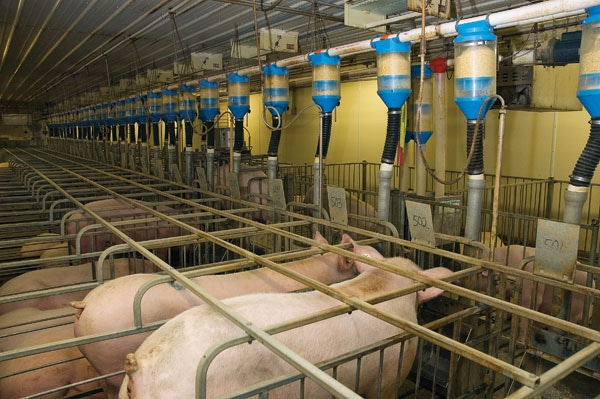National Pork Producers Council also testifies on implementation of Massachusetts law restricting pork production methods.

The North American Meat Institute (Meat Institute) filed a petition Friday, Feb. 26, for a writ of certiorari asking the Supreme Court of the United States to review an earlier ruling of the U.S. Court of Appeals for the Ninth Circuit in the Meat Institute’s challenge to the constitutionality of California’s Proposition 12: The Farm Animal Confinement Initiative. The Meat Institute opposes the law because it says it is unconstitutional and will hurt the nation’s food value chain by significantly increasing costs for producers and consumers.
“Prop 12 hurts the family on a budget by causing higher prices for pork, veal and eggs, and unfairly punishes livestock producers outside of California by forcing them to spend millions just to access California markets,” says Meat Institute President and CEO Julie Anna Potts. “If this unconstitutional law is allowed to stand, California will dictate farming practices across the nation.”
The question presented in the case is whether the U.S. Constitution permits California to extend its police power beyond its territorial borders by banning the sale of wholesome pork and veal products sold into California unless out-of-state farmers restructure their facilities to meet animal-confinement standards dictated by California.
In its brief, the Meat Institute urged the Court to grant review because the “Ninth Circuit’s decision conflicts with the decisions of other federal courts of appeals on the question whether the Constitution limits a State’s ability to extend its police power beyond its territorial borders through a trade barrier dictating production standards in other States and countries.”
Allowing Prop 12 to stand “insulates in-state farmers from out-of-state competition, while imposing crushing burdens on out-of-state farmers and producers who have no political voice to shape the regulations that California has unilaterally determined to foist upon their operations outside of California.”
In the Ninth Circuit, the Meat Institute’s lawsuit was supported by amicus curiae briefs filed by the United States on behalf of USDA, by 20 sovereign states, and by the National Association of Manufacturers, Chamber of Commerce and Food Marketing Institute who challenged Proposition 12 would have a "devastating effect on the pork and veal industries and thousands of small and family farmers throughout the nation, who will have their substantial investments in their existing farm facilities upended by California’s unconstitutional effort to dictate from afar the confinement standards for animals raised outside of California’s borders."
NAMI says the decision conflicts with decisions of at least six other circuits, which have expressly rejected the argument that the extraterritoriality doctrine is limited to price regulations, and which have applied the doctrine in other contexts—including contexts materially indistinguishable from this case.
In November 2018, California voters enacted Proposition 12, entitled the Prevention of Cruelty to Farm Animals Act, with the stated purpose “to prevent animal cruelty by phasing out extreme methods of farm animal confinement, which also threaten the health and safety of California consumers, and increase the risk of foodborne illness and associated negative fiscal impacts on the State of California.” However, the court filing notes the amendment was not accompanied by any legislative findings or evidence that meat from veal calves or breeding sows (or their offspring) not housed in compliance with Proposition 12 poses any increased risk of foodborne illness.
Massachusetts law hearing
Earlier in the week, National Pork Producers Council Assistant Vice President and General Counsel Michael Formica testified before a public hearing held Feb. 23 hosted by the Massachusetts’ attorney general’s office on implementation of Question 3, a 2016 ballot initiative which prohibits the sale of pork produced using certain production methods. In many ways, Question 3 is substantially similar to Proposition 12.
The Massachusetts initiative is set to begin on Jan. 1, 2022, but first requires the commonwealth’s attorney general to draft implementation rules—which have not been completed.
In comments, Formica urged the attorney general to: 1) involve experts who understand modern livestock and pork production in a collaborative process with impacted stakeholders; and 2) suspend the implementation date to ensure farmers and consumers are afforded the full, two-year window between promulgation of the rules and the effective date.
“Regulatory compliance will require the pork industry to divert resources from maintaining a critical food supply and reallocate personnel to prepare for the compliance deadline. Businesses will need to rework operations and supply chains to comply with the forthcoming regulatory requirements. Farmers will need to expend substantial capital costs to build or retrofit housing, which is a decades-long investment. To undertake those significant operational costs before the issuance of final rules and guidance would be impractical, if not impossible,” he says.
About the Author(s)
You May Also Like


.png?width=300&auto=webp&quality=80&disable=upscale)
.png?width=300&auto=webp&quality=80&disable=upscale)

